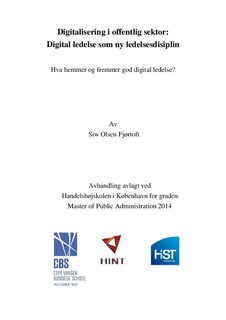| dc.description.abstract | This master thesis originates from my interest in new technology and the digitization processes that we see in society today. Due to my background in the field of education, I have both learned from and experienced many of the opportunities that go with digitization. However, I have also witnessed large variations in the public sector when it comes to the implementation and practice of these processes. The government has ordered public reports and written White Papers. Counties and municipalities have enacted strategic plans. A major objection is that digital leadership is not considered as a separate entity in the field of digitization.
The Danes have recently begun talking about digital leadership as a new form of leadership. My initial focus is to determine the content and the factors of digital leadership. My main research question is: What inhibits and promotes good digital leadership? The scope of the thesis will be limited to leadership that are exercised by leaders who are formally responsible and, as such, will be considering leadership that is directed towards the organization’s internal systems.
The outcome of my theoretical discussion of change leadership and strategic leadership forms the basis for three additional research questions and an analytical model used when structuring and analyzing empirical data. These three questions are:
1. How can administration influence digital leadership?
2. What is the importance of the leader’s digital competencies related to problem solving?
3. How does the formulation of goals and creation of organizatorical language relate to digital leadership?
I have chosen a qualitative approach, carrying out five in-depth interviews with leaders and people with professional expertise in the public sector. Furthermore, the set of interviews that the survey is based upon is modest, and one cannot necessarily generalize the conclusions made in this thesis to the level of the population.
I have also looked at secondary data, in the form of documents and reports on digitization. I have used Norwegian and Danish sources, both in terms of theory and empirical data, to help me understand digital leadership. This because Denmark is a leader in the field of digitization processes when compared to Norway, especially when it comes to common public strategies related to digitization. However the thesis is not a comparative study.
Digital leadership involves having digital competencies, consisting of the skills, knowledge, initiative and insight that make it possible to understand and harness the forces of change
vii
inherent in digitization for the benefit of the organization. The digital leader must not only be a visionary, but also be able to set clear targets for internal organizational processes and make the adjustments necessary for optimizing the working conditions of the employees.
Good digital leadership is promoted by good digital competencies, good procurement skills, cooperation across organizational boundaries, incentive-based regulation systems, efficient search and learning processes and a common, public strategy coordinating different systems.
Good digital leadership is obstructed by continuously including new administrative tasks, increased documentation requirements, a fear of making mistakes, a lack of digital literacy and acquisition expertise, fuzzy digital scorecards, "silo thinking" and a lack of understanding of what digitization can do for your organization.
By the end of the thesis key points are reflected upon and made available for public leaders. My results are not representing the truth about this discipline. My main intention is generating interest and providing insight into the opportunities and possible challenges confronting digital leadership. I also recommend others to write a thesis or do research about this unexplored academic field. | nb_NO |
